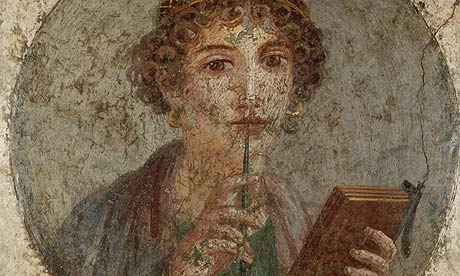Sappho Translated
A week ago — on the 22 February to be accurate — I posted the original Greek version of the recently rediscovered poem by Sappho addressing/chiding her brother, without the rather stiff academic translation that accompanied the poem. I suggested that I’d be interested in a better translation and — no major surprise, really (I had hopes that he would take the bait), though a very pleasant one — poet & translator George Economou has now sent in his version, which I’ll post below (followed by the Greek, plus here, the link to the original TLS blog that gives needed context). Enjoy — & thanks, George! P.s. If you haven’t yet, get & read Economou’s marvelous Ananios of Kleitor.
Sappho’s “The Brothers Poem”
[…………..]
Ah, there you go again about Charaxos making landfall
in a well-stocked vessel. Such stuff, I suppose, Zeus
knows all about together with the other gods, stuff you
[shouldn’t
even contemplate
Rather have me go and call out
numerous entreaties to Queen Hera
that he get back home here safely navigating
his ship, Charaxos,
and find us safe and sound. As for everything else,
let’s just turn that over to the gods.
For good weather can follow foul,
quickly from stormy to serene.
To those whom Olympos’ King chooses
to assign a guardian daimon, deliverance from grief
and from that time forth blessed serenity
and great wealth.
As for us, if Larichos would straighten up
and once and for all attain manhood,
from this heavy-heartedness of ours
we’ll quickly find release.
[. . .]
ἀλλ’ ἄϊ θρύλησθα Χάραξον ἔλθην
νᾶϊ σὺν πλήαι. τὰ μέν οἴομαι Ζεῦς
οἶδε σύμπαντές τε θέοι· σὲ δ᾽οὐ χρῆ
ταῦτα νόησθαι,
ἀλλὰ καὶ πέμπην ἔμε καὶ κέλεσθαι
πόλλα λίσσεσθαι βασίληαν Ἤραν
ἐξίκεσθαι τυίδε σάαν ἄγοντα
νᾶα Χάραξον
κἄμμ’ ἐπεύρην ἀρτέμεας. τὰ δ’ ἄλλα
πάντα δαιμόνεσσιν ἐπιτρόπωμεν·
εὐδίαι γὰρ ἐκ μεγάλαν ἀήταν
αἶψα πέλονται.
τῶν κε βόλληται βασίλευς Ὀλύμπω
δαίμον’ ἐκ πόνων ἐπάρωγον ἤδη
περτρόπην, κῆνοι μάκαρες πέλονται
καὶ πολύολβοι·
κἄμμες, αἴ κε τὰν κεφάλαν ἀέρρη
Λάριχος καὶ δή ποτ᾽ ἄνηρ γένηται,
καὶ μάλ’ ἐκ πόλλαν βαρυθυμίαν κεν
αἶψα λύθειμεν.


 Poasis II: Selected Poems 2000-2024
Poasis II: Selected Poems 2000-2024 “Todesguge/Deathfugue”
“Todesguge/Deathfugue” “Interglacial Narrows (Poems 1915-2021)”
“Interglacial Narrows (Poems 1915-2021)” “Always the Many, Never the One: Conversations In-between, with Florent Toniello”
“Always the Many, Never the One: Conversations In-between, with Florent Toniello” “Conversations in the Pyrenees”
“Conversations in the Pyrenees” “A Voice Full of Cities: The Collected Essays of Robert Kelly.” Edited by Pierre Joris & Peter Cockelbergh
“A Voice Full of Cities: The Collected Essays of Robert Kelly.” Edited by Pierre Joris & Peter Cockelbergh “An American Suite” (Poems) —Inpatient Press
“An American Suite” (Poems) —Inpatient Press “Arabia (not so) Deserta” : Essays on Maghrebi & Mashreqi Writing & Culture
“Arabia (not so) Deserta” : Essays on Maghrebi & Mashreqi Writing & Culture “Barzakh” (Poems 2000-2012)
“Barzakh” (Poems 2000-2012) “Fox-trails, -tales & -trots”
“Fox-trails, -tales & -trots” “The Agony of I.B.” — A play. Editions PHI & TNL 2016
“The Agony of I.B.” — A play. Editions PHI & TNL 2016 “The Book of U / Le livre des cormorans”
“The Book of U / Le livre des cormorans” “Memory Rose Into Threshold Speech: The Collected Earlier Poetry of Paul Celan”
“Memory Rose Into Threshold Speech: The Collected Earlier Poetry of Paul Celan” “Paul Celan, Microliths They Are, Little Stones”
“Paul Celan, Microliths They Are, Little Stones” “Paul Celan: Breathturn into Timestead-The Collected Later Poetry.” Translated & with commentary by Pierre Joris. Farrar, Straus & Giroux
“Paul Celan: Breathturn into Timestead-The Collected Later Poetry.” Translated & with commentary by Pierre Joris. Farrar, Straus & Giroux
This still doesn’t sound like the lyrical wedding songs that Sappho typically wrote. And it provides no new info on Sappho, but merely “confirms” what was already known. If these fragments are accepted as true Sappho poems, the financial value would be immense. Is no one else genuinely skeptical?